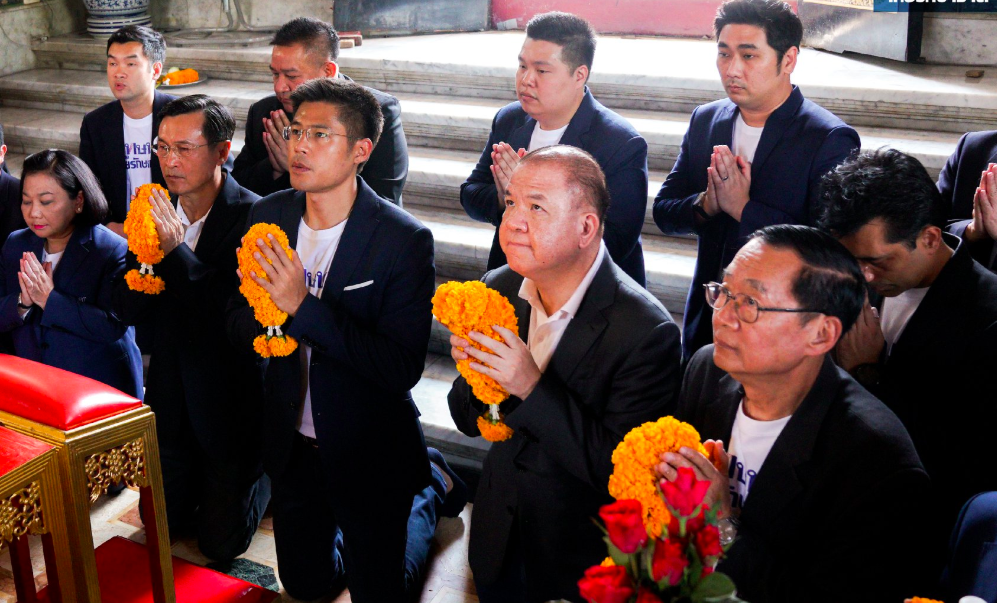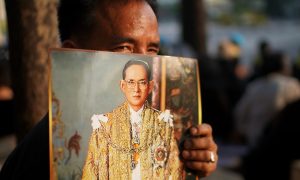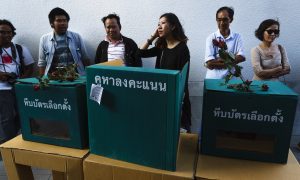Given Thailand’s long-running political chaos, the election scheduled for 24 March was always likely to be a messy affair. On 8 February, after two bombshell announcements and one big tremor, the Constitutional Court was once more embroiled in politics via the possible dissolution of the Thai Raksa Chart party.
On 8 February, Thais woke to the news that Thai Raksa Chart, one of three proxy parties of former prime minister Thaksin Shinawatra, had nominated former-Princess Ubolratana as its sole prime ministerial candidate. Ubolratana is the eldest daughter of the late King Bhumibol and the elder sister of King Vajiralongkorn. The announcement was then truly remarkable by any standards. While a few princes had held political office after the 1932 revolution, never before had royalty of this eminence been directly involved in electoral politics.
The announcement also directed the spotlight to rifts within Thailand’s parties. For instance, it exposed oft-forgotten rifts within the red-shirt movement. The majority was jubilant, accepting the move as a tactic to overcome a tricky constitutional hurdle: the first prime minister under the 2017 constitution will be chosen by a joint session of the House of Representatives and the Senate from a list of candidates submitted by parties which won at least 5 per cent of seats in the Lower House (25 seats). The procedure was designed to favour junta leader Prayuth Chan-ocha, who controls the 250-seat Senate. The former princess’s popularity and credentials could have won over the populace and overcome Prayuth’s control of the Senate. But a small clique of red shirts dreaded the deal, fearing it would create an unlikely amalgamation of farcical democracy and neo-absolute monarchy.
Ubolratana’s nomination showed Thaksin’s customary ingenuity in toying with the rules. The Constitution does not prohibit a member of the royal family from running for public office (actually, it implies the possibility that at least minor royals may do so). Section 184, regarding conflicts of interest, is not applicable to annuities for royalty. Still, convention stands against it. The Constitutional Court once ruled that the king, queen and their children have no duty to vote because they are meant to stay above politics. The Court cited correspondence in 1932 between King Rama VII (Prajadhipok) and the People’s Party, in which the former indicated his wish that his immediate family not get involved in politics.
Q&A: Supalak Ganjanakhundee on Thailand’s week of chaos
The editor of "The Nation" talks to New Mandala.
But thirteen hours after this first bombshell news, King Vajiralongkorn intervened. The Palace issued an announcement asserting that Ubolratana’s nomination was impertinent, because she remains a member of the royal family. Thaksin’s move quickly unravelled.
The Election Commission of Thailand has supported the King’s disqualification of Ubolratana, evoking the dissolution of Thaksin’s Thai Rak Thai party in 2006 and the barring of its senior members from politics. Prior to the Palace announcement, the Commission had stated that Ubolratana had every right to be a candidate and refused to take her name off the list. But in the aftermath of 8 February, the Commission promptly changed its reading of the law. Two days later, it unanimously agreed to petition the Constitutional Court to dissolve Thai Raksa Chart. The case commenced on Wednesday, 20 February.
Party dissolution has been a recurring theme haunting Thai politics, and especially Thaksin, for more than a decade. Arguably, it has been used regularly to knockout winners of popular elections who are considered undesirable by the powers-that-be.
Under the Political Party Act, the Constitutional Court may dissolve a party that has attempted to overthrow the democratic regime of government with the king as the head of state (Section 92). Political party laws have long included this provision, but the anti-Thaksin camp invoked it for the first time in 2007, when the Constitutional Court ruled that Thai Rak Thai had hired smaller parties as “competitors” in order to validate the 2006 election (from which a number of parties had withdrawn).
In 2008, the Court dissolved the People’s Power Party (Thai Rak Thai’s descendant) and two related parties for vote buying. Though the Democrat party, which subsequently formed a minority government, had been charged with mismanagement of campaign finances, the Court acquitted it for the technical reason that the Election Commission had failed to meet the filing deadline to submit the case. Between 2012–14, former prime minister Yingluck Shinwatra’s Pheu Thai Party was accused of attempting to overthrow democracy by amending the 2007 Constitution. The Court found the amendment motion unconstitutional but not serious enough to trigger dissolution.
Party dissolution is problematic for several reasons. First, it has so far failed to set a clear precedent: electoral fraud is held to warrant party dissolution but an unconstitutional amendment is not? The seriousness or danger to democracy with the king as head of state represented by acts brought to the Constitutional Court appear still highly debatable. The Constitutional Court’s reasoning in both cases has not been convincing.
Second, the standard of proof is murky. While party dissolution is as serious a punishment as some forms of criminal punishment, the Constitutional Court’s standard of proof seems not to be “beyond reasonable doubt” so much as “a probability”. A decade after Thai Rak Thai was dissolved, the Criminal Court acquitted a Thai Rak Thai executive of a charge of electoral fraud—the very act for which the party was dissolved.
Third, the punishment for acts hostile to the democratic regime of government with the king as head of state is unusually severe. All members of the party are punished should the executive fail to prevent a crime. Punishment is however most harsh for party executives, who sometimes number in the hundreds: a ban from engaging in politics. Previously, the ban involved a cancellation of voting rights for five years. According to the Constitution Drafting Committee members, the 2017 Constitution now only revokes the right to run for MP—but the ban lasts a lifetime.
Thai Raksa Chart’s fate this month depends very much on how the Court chooses to interpret the party’s intentions. Was the nomination of Ubolratana just a gullible error by a party that wanted to win so badly it lawyered a constitutional rule? Or was it a mischievous plan to damage the monarchy?
Unfortunately, years of colour-coded politics have convinced Thais that the Constitutional Court is no longer an impartial arbiter who safeguards democracy. After 2006, the year when the yellow shirts began to demand “judicial activism”, there was a notable shift in the Court’s stance. There is much evidence that the Court has aggressively scrutinised Thaksin’s political followers but been much more lenient towards the Democrat party and later, the junta. The pattern over the years suggests that the Court’s decisions are about politics, not law.
As our recent study highlighted, the Constitutional Court has become increasingly biased in high-profile political cases and judicial appointments have clearly been politicised. Since the 2006 coup, the Constitutional Court has recruited fewer legal and political science experts in favour of career judges, who are generally considered more conservative in outlook. Constitutional Court judges are recruited by a body of other watchdog agencies, then confirmed by the Senate. Although judges are supposed to be nominated through a politically-isolated procedure, this procedure barely cloaks practices of selecting candidates with “desirable” ideology and building loyalty networks to encompass the military establishment and judiciary.
Changes in the composition of the bench coincided with the shift from deferential to assertive performance in high-profile cases, but only as far as the Thaksin-aligned political camp is concerned. Some appointed judges are on record as having displayed anti-Thaksin sentiment. The best-known case is perhaps Judge Jaran Pakdeethanakul, who has publicly criticised Thaksin and was involved in the 2006 coup regime before his nomination. Not surprisingly, his judgement record shows that he is the top voter against the former prime minister. Equally concerning is that 5 of the 9 judges were due to retire years ago, but had terms extended by the NCPO’s dictatorial power (Order 24/2560). Meanwhile, the Constitutional Court itself has also engaged in the creation of political networks in support of the military junta, with some judges directly recruited from these networks.
Given the Constitutional Court’s recent record, the decision in the Thai Raksa Chart case is likely to be swift but unlikely to be impartial. If the Court delivers a verdict before the 24 March election, it will be devastating for Thaksin no matter the outcome. Although each party was allowed to put forward three names for prime ministerial candidature, Thai Raksa Chart nominated only Ubolratana. Her disqualification has already reduced the number of potential prime ministers aligned with Thaksin. Moreover, Thaksin pursued the strategy of three parties running in different constituencies to avoid intra-party competition. If the Thai Raksa Chart cohort is lost, Thaksin will not be able to replace it—and the unfair electoral rules have already been directed to his disadvantage.
Some anti-NCPO parties have tried to adopt the tactic of their opponents by asking the Constitutional Court to dissolve the NCPO’s own proxy, the Phalang Pracharat Party, for nominating Prayut. But the Election Commission is unlikely to entertain those requests.
The possible consequences of the Constitutional Court’s judgement on Thai Raksa Chart go well beyond Thaksin and his political ambitions. While he might be punished merely for an ambitious plan, his fellow Thais are likely to lose their chance of getting rid of military dictatorship.
 Facebook
Facebook  Twitter
Twitter  Soundcloud
Soundcloud  Youtube
Youtube  Rss
Rss 



